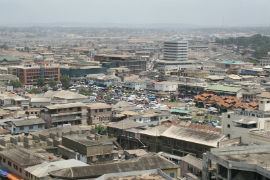Scientists warn of the risk from air pollution over the megacities of West Africa
Posted on 21 August 2015
 Central Accra
Central Accra
The atmosphere above West Africa is still one of the least studied and understood on the planet, despite its central role for the health and economic wellbeing of a large and increasing population.
Rapidly expanding cities such as Lagos in Nigeria, Accra in Ghana and Abidjan in Ivory Coast are producing large amounts of harmful aerosols and gaseous pollutants.
Scientists say human health, food security and the climate of the region is at risk and there is an urgent need for better observations and models to quantify the magnitude and characteristic of these impacts.
The region’s climate is characterized by a sensitive monsoon system which controls winds, temperature, clouds and most importantly rain. Changes in air pollutants may be causing changes in the solar heating and clouds, which in turn may lead to changes the rainfall and temperature.
As the population of the region grows these changes may intensify, the scientists say.
The study, published in Nature Climate Change, is part of a EU-funded research project which is led by Professor Peter Knippertz from the Karlsruhe Institute of Technology, and also involves the University of Leeds and other European and African institutions.
The scientists warn that the region has been, and is projected to be, subject to substantial greenhouse-gas-induced warming with the monsoonal flows particularly sensitive to the impact of aerosols.
Professor Mat Evans, based at the Wolfson Atmospheric Chemistry Laboratories at the University of York and one of the authors of the study, said: “The story here is that climate change is happening, there’s no doubt about that.
“How that manifests itself with something like rainfall, which is what really matters, is much more complicated.
“If we are missing key processes in our models because we have not gone out and tested them in challenging environments then we have less confidence in what is going on.”
Professor Evans said it was vital that any future policy advice is based on sound scientific observations from the region.
“If you are going to make plans for how to deal with this in the future you want to do it from a position of knowledge rather than a position of ignorance. We need to get more observations in the region and we have started to do that.
“At the moment we don’t have the observations to be able to test the models to even know how good the predictions are.”
He said the most urgent need now was to collect much needed data from the atmosphere above West Africa.
“Ultimately, what we want to be able to do is make predictions about what we think will happen in a five year timescale, 10 year timescale and 50 year timescale.
“The environmental degradation maybe local but the implications can be regional and global. One of the potential impacts is population migration.
“If people have no food because the climate is changing in their region then they will move. There are knock on effects.”
Further information:
- The research: ‘The possible role of local air pollution in climate change in West Africa’ was funded from the European Union Seventh Framework Programme (FP7/2007-2013) under grant agreement 603,502 as part of the Dynamics-aerosol-chemistry-cloud interactions in West Africa (DACCIWA) project. The link to the paper is: http://nature.com/articles/doi:10.1038/nclimate2727
- DACCIWA is a collaboration of 16 institutions from Europe and Africa which is making measurements of air quality and meteorology in West Africa and exploring those observations through a range of state-of- the- art computer simulations over the next three years to investigate the links between air quality, meteorology and climate. The project is led by Prof Peter Knippertz at the Karlsruhe Institute of Technology together with scientists from Centre National de la Recherche Scientifique (CNRS), France; Deutsches Zentrum für Luft- und Raumfahrt (DLR), Germany; Eidgenössische Technische Hochschule Zürich (ETHZ), Switzerland; European Centre for Medium-Range Weather Forecasts (ECMWF), UK, Kwame Nkrumah University of Science and Technology (KNUST), Ghana; Met Office, UK; Obafemi Awolowo University, Nigeria; The University of Manchester, UK; The University of Reading, UK; Université Blaise Pascal Clermont-Ferrand II, France; Université Paris Diderot, France; Université Paul Sabatier Toulouse III. France; Université Pierre et Marie Curie, France; The University of Leeds, UK; University of York, UK.
- For more information visit:
Explore more news

Sodium channels in breast cancer cells a promising target for future treatments, study reveals
Thursday 25 July 2024

Cooling the classroom: University of York researchers to investigate UK schools’ responses to hot weather
Wednesday 24 July 2024

Hunter-gatherers kept an 'orderly home' in the earliest known British dwelling, study shows
Tuesday 23 July 2024

Study uses Game of Thrones to advance understanding of face blindness
Tuesday 23 July 2024

York academic contributes to new report on men’s health which reveals disparities between most and least deprived areas in the UK
Wednesday 17 July 2024
